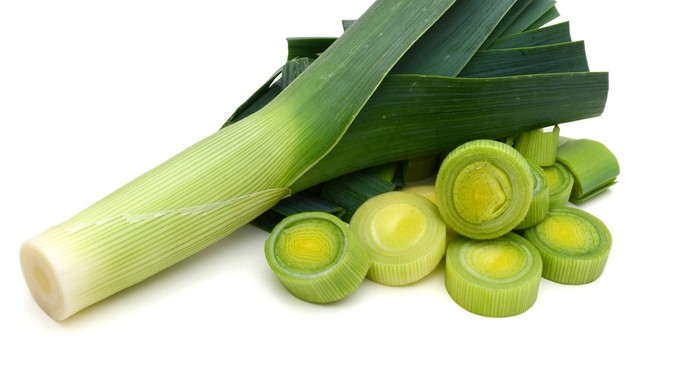Leeks, scientifically known as Allium ampeloprasum var. porrum, are a type of vegetable closely related to onions, garlic, and shallots. Let’s explore some information about leeks:
Leeks Meaning in Urdu: Leeks are known as “Kanda Gajar” in Urdu.
Leeks Plant: Leeks are biennial plants that belong to the Allium family. They have long cylindrical stems composed of overlapping layers and can grow to various lengths.
Leeks Benefits:
- Nutritional Value: Leeks are low in calories and fat but rich in vitamins and minerals. They provide vitamins A, C, and K, as well as folate, manganese, and iron.
- Antioxidant Properties: Leeks contain antioxidants, such as flavonoids and polyphenols, which can help protect the body against oxidative stress and reduce the risk of chronic diseases.
- Digestive Health: Leeks are a good source of dietary fiber, which can support digestive health by promoting regular bowel movements and maintaining gut health.
- Heart Health: The flavonoids and sulfur compounds present in leeks may have potential benefits for heart health by reducing the risk of cardiovascular diseases.
- Anti-inflammatory Effects: Some compounds found in leeks, such as kaempferol and quercetin, have anti-inflammatory properties that may help reduce inflammation in the body.
- Immune System Support: Leeks provide vitamin C, which is essential for a healthy immune system and can help protect against infections and illnesses.
- Bone Health: Leeks contain vitamin K, which plays a role in bone health and helps with blood clotting.
- Weight Management: Leeks are low in calories and high in fiber, which can contribute to a feeling of fullness and aid in weight management.
Leeks Recipes: Leeks are versatile and can be used in a variety of recipes. They can be sautéed, roasted, grilled, or used in soups, stews, casseroles, and as a flavoring ingredient in various dishes.
How to Cook Leeks: To cook leeks, start by trimming off the dark green leaves and the root end. Cut the leeks lengthwise, wash them thoroughly to remove any dirt or sand trapped between the layers, and then slice or chop them according to your recipe. Leeks can be cooked by sautéing, steaming, boiling, or roasting until tender.
Growing Leeks: Leeks are typically grown from seed and require a well-prepared soil with good drainage. They are usually started indoors and then transplanted to the garden. Leeks prefer cool weather and require a long growing season. They are usually planted in trenches and gradually filled with soil as the leeks grow.
Leeks Vegetable: Leeks are a vegetable with a mild and sweet onion-like flavor. They are often used as a flavoring ingredient and can be cooked and consumed similarly to onions.
Leek Origin: Leeks are believed to have originated in the Mediterranean region and have been cultivated for thousands of years.
Leek Soup: Leek soup is a popular dish made by sautéing leeks with other vegetables, such as potatoes, and then simmering them in broth until tender. It can be enjoyed as a creamy or broth-based soup.
Leek Scientific Name: The scientific name of leeks is Allium ampeloprasum var. porrum.
Leeks Vitamins and Minerals: Leeks provide vitamins A, C, and K, as well as folate, manganese, and iron. They also contain smaller amounts of other minerals such as calcium, potassium, and magnesium.
Leek Benefits and Side Effects: While leeks offer various health benefits, such as nutritional value, antioxidant properties, and potential support for digestive and heart health, individual tolerance and sensitivities may vary. Some people may experience digestive discomfort or allergic reactions to leeks. It’s always best to consume leeks as part of a balanced diet and consult with a healthcare professional if you have any specific concerns or conditions.
Leek Benefits for Weight Loss: Leeks can be beneficial for weight loss due to their low calorie and high fiber content. The fiber in leeks can help promote satiety and regulate appetite.
8 Benefits of Leeks: The benefits of leeks include their nutritional value, antioxidant properties, digestive health support, potential benefits for heart health, anti-inflammatory effects, immune system support, bone health, and potential weight management support.
Leek Advantages and Disadvantages: Leeks offer unique flavor and culinary versatility, and they are a nutritious addition to meals. However, they can be more time-consuming to prepare and clean compared to other vegetables. Additionally, some individuals may experience digestive discomfort or allergic reactions to leeks.
Leeks Male and Female: Leeks are not classified as male or female plants. They reproduce through cross-pollination, and their flowers produce seeds for propagation.
Please note that while I strive to provide accurate and up-to-date information, it is always recommended to consult with a healthcare professional or nutritionist for personalized advice and guidance regarding specific health concerns and dietary needs.

